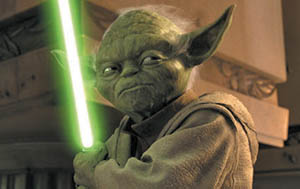
I. Jedis as Warriors
As a child growing up with the original Star Wars movies, I developed an impression of Jedis as space-monks, serene individuals immersed in wisdom and trained in self-defense. While disciplined warriors, they were ideologically opposed to violence except as a last resort. However, the later prequel movies developed the Jedi perspective as they appeared as generals, leading armies into battle. This seemed to me to be a far cry from the seemingly pacifist ways of the earlier portrayals. I found a deeper understanding of the Jedi philosophy in the halachos of warfare. The Sages discuss three gradations of fighting, each exhibiting a different mindset toward violence.
The Torah recognizes a person’s right to self-defense. When facing an intruder, a homeowner may use lethal force to defend himself, if necessary (see Ex. 22:1-2; Sanhedrin 72a). The Sages say, “If someone comes to kill you, kill him first” (Bamidbar Rabbah 21:4). It is a mitzvah to save someone whose life is in danger. Effectively, this refers to serving as a bodyguard or police officer. This was my original vision of a Jedi—space bodyguards.
War is sometimes a mitzvah, but Jewish law differentiates between mandatory and optional wars. Mandatory wars include specific wars that the Torah requires, such as defeating Amalek. It also includes a defensive war. The Rambam (Mishneh Torah, Hilchos Melachim 5:1) describes a defensive war as “a war fought to assist Israel from an enemy that attacks them.” Any general in this war serves a role that is greater than that of a bodyguard. He actively leads an attack, but only after being attacked first. He is a defensive warrior.
In contrast, an optional war—to expand Israel’s borders—is an offensive war. This type of war is permissible within halacha but exhibits a different attitude toward warfare. A defensive war implies a realistic view of politics: sometimes war is necessary to maintain peace. Rambam (ibid. 6:1) writes, “We never wage war against anyone until we first seek peace.” Only if that fails do we wage war. In contrast to a defensive war, an offensive war allows for natural expansion of a kingdom following international standards of the time.
It seems that the portrayals of Jedis moved from bodyguards to soldiers in defensive wars. Serving as a guardian of the peace sometimes requires engaging in battle and not just guarding oneself. However, they do not seem to wage offensive wars.
II. The Force Choke
As a thought experiment, I was wondering what Jewish law would say about the force choke. Wookiepedia (no, that is not a typo) defines a force choke as “a dark side Force power where one would strangle the victim with the Force. It was often performed with a grip-like gesture.”
If a Jedi or Sith kills someone with a force choke, is he liable for execution? On the one hand, he directly caused a death and should be punished. On the other, I assume that any hand motions of a Jedi—the “grip-like gesture”—are unnecessary and that really Darth Vader can perform a force choke with his hands tied behind his back. If so, he technically committed no action. Can someone be executed for merely thinking about murder?
There is precedent for this question in halachic literature. Authorities have discussed whether someone who kills by invoking God’s name is liable for murder. Tradition teaches that when Moshe saved an Israelite slave’s life by murdering the Egyptian taskmaster, he did so by invoking God’s name. If someone did that in a different situation that did not involve saving someone, would the murderer be held liable? The author of Responsa Halachos Ketanos (vol. 2, no. 98) argues that he is liable.
The Chida (Devash Le-Fi, mem, no. 5) distinguishes between types of murders. The Gemara (Shabbos 33b) tells the story of Rabbi Shimon Bar Yochai’s (Rashbi) exit from the cave in which he hid for many years. After all that time of constant Torah study, he was shocked to see a Jew work. In his disappointment, Rashbi looked at the man with a devastating stare, causing him to die. Not everyone reads that story literally, but the Chida does. He suggests that killing someone by looking at him—without saying anything—is different from invoking God’s name for murder. Someone who does the former is exempt from human punishment while someone who does the latter is liable.
Rav Chaim Palaggi (Responsa Lev Chaim, vol. 2 Orach Chaim no. 188) argues that no one who kills in a supernatural way is liable for punishment. In such cases, God kills; not the person. Murder is the cessation of a life within natural means. A miraculous murder is out of human hands.
If a force choke is comparable to killing silently, then perhaps the Halachos Ketanos would hold a Jedi liable for such a super murder. The Chida would seem to exempt him, as would Rav Chaim Palaggi. They would let Darth Vader get away with murder but that is not surprising because Jewish law has a very high bar for execution. Presumably, he would get punished by divine hands instead, in this world or the next.
By Gil Student











